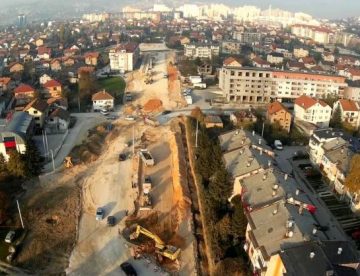
CONSTRUCTION OF GRAČANICA SEWAGE TREATMENT NETWORK
We are currently planning and designing a separated sewage system for the urban area of Gračanica Municipality. This includes construction of drainage systems for municipal and industrial wastewater which are separated from the surface water drainage. 15,767 metres of sewage pipes will be laid – including 13,015 metres of primary and 2,752 metres of secondary pipes.
According to designs, the separated sewage system is divided into three sections. Sections 1 and 2 should be completed by the 30th of November, 2015. The last section should be finished by the 31st of May, 2016. Works are also under way on the construction of the sewage treatment plant on the left bank, which is part of the Section 1, as well as the OKU3, KU3 and OKD3-S channels in Section 2. As for the Section 3, so far we have completed some of the preparation works, along with the procurement of building materials.
The implementation of the project as a whole is proceeding according to schedule.
Apart from Euro-Asfalt, two subcontractors are also engaged in this project – Džim Company Tuzla and Amgrad Gračanica.
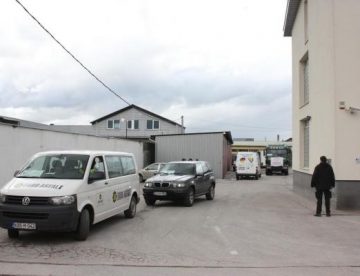
EURO-ASFALT AWARDED CERTIFICATE OF APPRECIATION FOR ITS RESPONSE TO 2014 FLOODS
The Civil Defence Authority of the Federation of Bosnia and Herzegovina celebrated the 1st of March – the Day of the FBiH Civil Defence Authority, as well as the World Civil Defence Day. Marking the occasion, the Civil Defence Service presented certificates of appreciation to individuals and companies whose efforts and dedication in 2014 helped protect and rescue people and property. Euro-Asfalt was awarded the certificate for its selfless assistance provided during the floods that struck Bosnia and Herzegovina in 2014.
Head of the FBiH Civil Defence Authority Jerko Ivanković Lijanović stated that the floods and the landslides have taught us an important lesson that all segments of the civil defence system need to be well-trained and equipped for the performance of their tasks.
“This is the only way of assessing the adequacy of our response to the challenges posed by natural disasters identified in defence and rescue plans. I shall use this opportunity to extend my appreciation to all individuals and companies on their selfless dedication to protection of people and property,” Lijanović said.
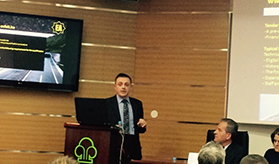
EURO-ASFALT ATTENDS REGIONAL WESTERN BALKANS CONFERENCE
Head of the Euro-Asfalt International Projects Department Edmir Eminović stated that the survival and growth of the regional building industry depends on flexible national policies, specialization of construction companies, and the creation of consortiums for a stronger impact in the market.
A regional Western Balkans conference was held in Sarajevo, with the key topic being: “Public procurements as the main strategic function of good management.” Representatives of the construction company Euro-Asfalt from Bosnia and Herzegovina also took part in the conference.
Speaking at the panel session “How to organize regional companies to maximize bidding potential in the region and the impact in third markets,” Eminovic mentioned some of the challenges and possible ways to overcome them when it comes to public procurement procedures in the region and in foreign markets. According to him, the factors identified as obstacles in regional tender procedures include bid bonds, references, well-versed and experienced staff, as well as formal procedures.
“There are certain conditions that must be met by companies from Slovenia, Serbia, Croatia, BiH, Macedonia, Montenegro and Kosovo to become competitive in large-scale regional and international biddings. These include bid bonds, equipment, expert staff and workers able to meet the investors’ demands and bidding conditions. I will highlight the factors that are bringing this region closer. These include a common or similar language, legislation that has resulted from former Yugoslav laws, as well as the particular links between individual countries of the region and large global markets, namely Serbia’s ties with the former USSR, BiH’s ties with the Islamic world, Croatian and Slovenian ties with the EU countries,” Eminović explained.
The regional Western Balkans conference was organized by the Foreign Trade Chamber of Bosnia and Herzegovina.
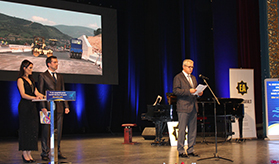
EURO-ASFALT GENERAL SPONSOR OF THE 2014 ATHLETE OF THE YEAR AWARD
Euro-Asfalt was the general sponsor of the 2014 Athlete of the Year Award. The award ceremony was held on Friday, the 23rd of January 2015 at the National Theatre in Sarajevo. It was attended by many celebrities, politicians and athletes from Bosnia and Herzegovina. The Athlete of the Year Award went to judoka Larisa Cerić. Miralem Pjanić, member of the national football team and the star of AS Roma, was declared the BiH Ambassador of Sports./p>
Euro-Asfalt CEO Hamed Ramić stated in his address that sports are neglected in Bosnia and Herzegovina. Great athletic talent, both in individual and in team sports, is underfunded, not equipped for proper preparations and training, and lacks other conditions for being professional athletes.
“As you know, I come from the private sector. I am the CEO of Euro-Asfalt, a leading construction company in BiH. Just as our athletes carry the name of our country through stadiums across the globe, Euro-Asfalt also carries the name of Bosnia and Herzegovina across the world’s building sites. Our path is not simple and our goals are not easy. We are aware of the difficult task ahead of our distinguished athletes as they conquer new countries, side by side with the best and the strongest,” Ramić said.
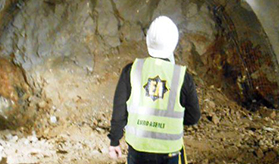
Projects under construction
The total length of the 5c Corridor section between Svilaj and Odžak is 10.8 kilometres. A consortium led by Strabag AG from Austria, and also including Bosnian-Herzegovinian companies Euro-Asfalt and ŽGP from Sarajevo, won the construction bid. Apart from the motorway, this project also envisions the construction of a border crossing at Svilaj, and two junctions Svilaj and Odžak. Notable structures include two junctions Svilaj and Odžak, three bridges, a resting area, and three flyovers.
A consortium led by Euro-Asfalt was engaged in the construction of the Primary Urban Thoroughfare in Zenica. The total length of the thoroughfare, including service roads and roundabouts, is 7.8 kilometres, of which the main road stretches for 3.2 kilometres. The project envisioned the construction of the main road, service roads, the regional road, bridges, concrete structures, the complete drainage system, street lighting, as well as removal of 30,000 cubic meters of category V and VI materials followed by asphalt paving.
Euro-Asfalt is also involved in the cutting and construction of the QAFE BUALL Bulqize tunnel in Albania. The total length of the tunnel is 460 metres. The portal area is 24 metres long, while the cutting is 436 metres long. The cutting technique applied in this project is the New Austrian Tunnelling Method (NATM).
In 2010, Euro-Asfalt was also engaged in the reconstruction and rehabilitation of the existing multi-storey car park which forms a part of the Euro Park shopping mall in Maribor, Slovenia. This chain of shopping malls is well-known across Europe. Thanks to its experience, Euro-Asfalt was able to use this engagement to establish a foothold in the Slovenian market, where it plans to stay for the long term.
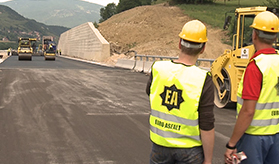
EURO-ASFALT: A SUCCESSFUL YEAR
Completed projects in Bosnia and Herzegovina
The overall length of the future Pan-European Corridor 5c through BiH is 336 kilometres, of which 285 kilometres are located in the Federation of BiH, and 51 kilometres in the RS. Euro-Asfalt carried out six construction projects in Bosnia and Herzegovina in 2014, five of which were sections of the 5c Corridor motorway.
Euro-Asfalt was engaged in the construction of subsections Suhodol-Tarčin, Vlakovo Lepenica and Lepenica-Suhodol, which are part of the 19.8 kilometres long section Vlakovo-Tarčin. The project envisioned the construction of the motorway, junctions Vlakovo and Lepenica, along with underpasses, flyovers and hydro-technical installations, as well as toll stations Vlakovo and Lepenica. All three subsections were completed according to schedule, thanks to the dedication of our management, our workers, engineers and consultants, as well as the state-of-the-art heavy equipment owned by Euro-Asfalt.
In 2014, Euro-Asfalt completed the construction of the 3.5 kilometres long Drivuša-Gorica-Bilješevo section of the Drivuša-Gorica motorway. The construction works encompassed the motorway, bridges M (60 metres), M1 (120 m), M2 (340 m), and M3 (550 m), as well as a traffic control centre and a toll station.
The greatest engineering feat – the Stage 1 (tunnel excavation and setting-up of primary formwork) of the longest tunnel built in recent history not only in BiH, but in the entire Southeast European region – was completed by Euro-Asfalt and its consortium partners on the Independence Day of Bosnia and Herzegovina, the 1st of March 2013. The time for completion of the first stage was 33 months.
The second stage, which included the construction of secondary lining, was completed in record time. We used the newest sliding metal formwork. With three such forms we were able to line 12 metres of concrete per day. The practically record-breaking monthly progress was around 1,000 metres. The entire second stage was completed in six months. The “1st of March” Tunnel consists of two tubes 2,949 metres and 2,914 metres in length. It is equipped with state-of-the-art technology, including video surveillance, internet connection, fire alarm systems and tunnel road accessories.
Project LOT3A, also known as the Sarajevo Bypass, is located north-west of Sarajevo in the Bosna river valley. The bypass is conceived as a motorway with two carriageways separated by a central reservation. Each of the carriageways consists of a driving lane, a passing lane, and an emergency stopping lane. The 3.3 kilometres long subsection of the Sarajevo Bypass between Butila and Vlakovo was completed on schedule. This segment of the motorway included the Bojnik Viaduct, which lies entirely on the motorway course, and two underpasses, Osijek and Treševine.
Euro-Asfalt was also engaged in the reconstruction and expansion of the Stup Junction. Prior to the involvement of our renowned company, this junction was widely known as the main bottleneck forcing drivers to waste their valuable time stuck in traffic.
A new carriageway had to be built together with two additional slip roads. The city’s primary longitudinal road was widened to include new footways and a new bike lane. New underground pedestrian crossings with exits towards tram stations were built to increase the safety of pedestrians. The existing road bridge was reconstructed.
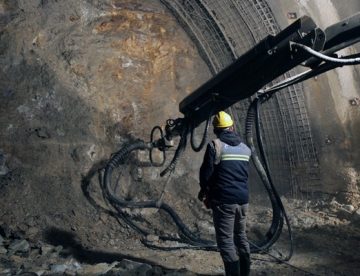
TALES FROM THE BUILDING SITE: SAID DŽAFIĆ ON BUTILA-VLAKOVO SUBSECTION
Head of the LOT3 project and coordinator of the LOT3A on behalf of Euro-Asfalt, Said Džafić: The advantages of Butila-Vlakovo road are already felt by drivers. Sarajevo Bypass is part of a future Pan-European Corridor 5c. It is located north-west of the city, in the valley of the Bosna River. The construction of the bypass has been divided into three sections: LOT1, LOT2 and LOT3. Euro-Asfalt is one of the contractors on this project. Today, as part of our series “Tales from the building site,” we paid a visit to the Butila-Vlakovo subsection, known to builders and Sarajevans as LOT3A
According to LOT3 Project Head and LOT3A Project Coordinator on behalf of Euro-Asfalt, Said Džafić, the section 3A is conceived as a divided motorway with two carriageways, each containing two traffic lanes – one lane for direct traffic and one for overtaking – and one emergency stopping lane. The 3,300-metre subsection Butila-Vlakovo has been completed within deadlines, and its advantages can already be felt by drivers. LOT3A continues right where LOT1 leaves off, in the immediate vicinity of the Butila Junction. It continues south-west towards Vlakovo Junction. This road is important as it allows drivers going from Zenica to Mostar and vice-versa to bypass Sarajevo.
“With this section, we have a continuous motorway from Zenica to Tarčin. The investor’s most likely intention was to connect these two points and alleviate traffic congestion in Rajlovac and the Stup Junction,” Džafić said.
This section also includes Bojnik viaduct which follows the length of the motorway course, and two underpasses, Osijek and Treševine. It was a challenging construction project as it was done in an area prone to flash flooding. This required additional ground preparations prior to the construction of embankments and the road surface, Džafić added, and explained the way building material is selected:
“Each type of building material had to be tested and approved by the supervising engineer. Another round of control testing takes place during the filling process. Therefore all of the prescribed standards and norms for these types of structures have been observed.”
Džafić also briefly reflected on the sound barriers:
“The sound barriers are made of aluminium panels in different colours, which have to adhere to the prescribed type and level of noise protection. The project began in August 2013 and ended in June 2014. We were fortunate to have good weather conditions, except for April and May, which were marked by catastrophic floods. But, thanks to our good approach and organizational skills, we have managed to finish the job,” Džafić explained.
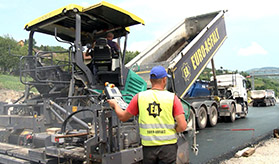
CONSTRUCTION OF SARAJEVO BYPASS CONTINUES
A consortium of BiH companies, consisting of Euro-Asfalt and ŽGP, has been selected as the best bidder for the construction of sections 2A and 2B of the Sarajevo Bypass.
According to Euro-Asfalt’s Executive Design, Technology and Organisation Officer, engineer Munir Ramić, the 2A section envisions the construction of the Briješće Viaduct, demolition and replacement of the existing M17 flyover in Briješće, as well as Briješće roundabout.
Ramić explained that the project will also include reconstruction of several access roads. The construction of section 2B will involve the paving of the surface layer between the Stup Junction and Briješće roundabout. The total cost of both sections amounts to 23,300,000 KM, VAT included.
“The completion of this project will alleviate traffic congestion that has been haunting this section of the M17 road, between Jošanica and Stup junctions, for many years. It will also mark the completion of the entire Sarajevo Bypass. The consortium leader, Euro-Asfalt, and its partners will undertake all available technical and organisational measures to reduce traffic obstructions as much as possible during the construction,” Ramić said, adding that this construction project will exclusively employ domestic companies.
The time for completion of the project is 11 months. The construction will begin as soon as the consortium led by Euro-Asfalt is granted site possession.
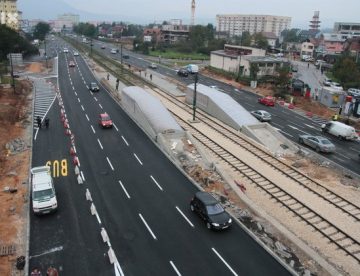
TALES FROM THE CONSTRUCTION SITE
Head of the “Stup Junction” Project Zdenko Bojić: The bike lane requires a special kind of red asphalt pavement
The 12th Transverse Road Reconstruction and Expansion Project, more commonly known as the “Stup Junction”, is nearing completion. The chief contractor is the BiH construction giant Euro-Asfalt. According to the Project’s head, civil engineer Zdenko Bojić, the project envisions the expansion of the Stup Junction by adding an additional two-lane carriageway. The two carriageways are separated by a central reservation.
A new bridge had to be constructed, along with two slip roads. The city’s primary longitudinal road had to be expanded to include additional footways, a bike lane, and underground pedestrian crossings for safer passage to and from the tram stations. The existing carriageway was renovated. Bojić explained that it was stripped down to its bare concrete structure and received a complete overhaul.
Escalators were installed in the underground crossing exits. The escalators and the corridors are brand new, and must be properly maintained or they will not serve their purpose. Since the escalators are leading up to the tramway stations, the plan is for GRAS to install ticket-selling booths at the exits. These will be the first such booths in Sarajevo, Bojić explained, adding that this construction project presented builders with numerous challenges.
“Stup is the most heavily used road junction in Bosnia and Herzegovina. The project was completed on time, even though we faced many difficulties. All of the city’s cables and utility ducts go through this area. Every time we’d use an excavator, we would run into more cables, water or gas pipes. Everything was done with great care, and finished within deadlines.” The Stup Junction, which is directly connected to the motorway, has significantly reduced traffic congestion, and it has made transit towards Mostar and Foča much easier.
“I was not born in Sarajevo, but I do remember waiting for hours at this junction, trying to get to Mostar or Ilidža. This project should have been done ten years ago. But the important thing is that favourable conditions have been created, and that the project is now in its final stage.”
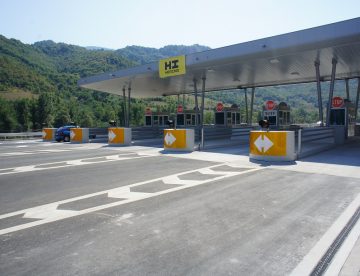
CONSTRUCTION UPDATE (22 AUGUST): VLAKOVO – LEPENICA
The construction tasks entrusted to our company on the Vlakovo-Lepenica motorway section are proceeding according to plan. Current activities include:
– Building of the HBM ground stabilization layer,
– Paving of asphalt layers
– Installation of traffic sign accessories,
– Building of the Lepenica toll station,
– Erection of sound barriers.


